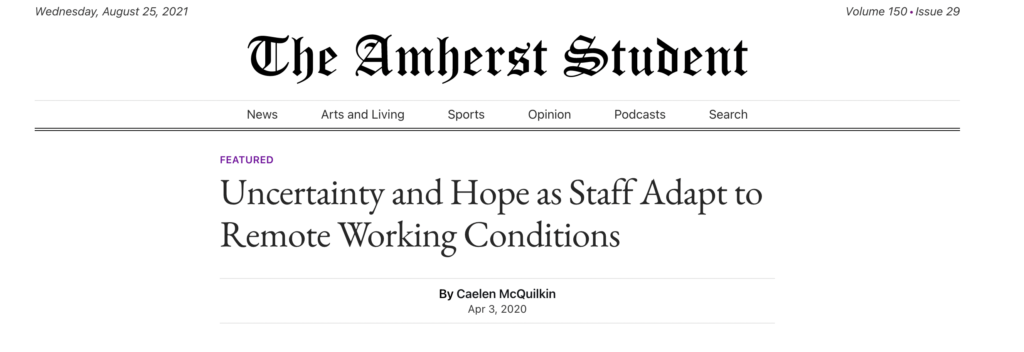
Published in The Amherst Student on April 3, 2021
A wide variety of changes to the duties of essential staff members have moved swiftly across campus in the wake of the college’s decision to move to a remote work model on March 15 in response to the COVID-19 pandemic. Changes to the jobs remaining on campus, which include departments like custodial work and information technology (IT) among others, have altered both the college’s operations and the way that staff members approach their jobs.
With only a select few students remaining on campus in Morrow, Moore and Morris Pratt dormitories — or the 3Ms, as the administration refers to them — the need for many of the college’s usual services has diminished, with most staff no longer asked to report for work every week. However, the administration is still paying all staff for their usual hours and continuing work benefits such as health insurance, which is particularly important to employees during a public health crisis, Director of Custodial Services Heidi Kellogg said.
In addition, employees who are immunocompromised or have responsibilities that make it difficult for them to come into work as a result of the pandemic are able to stay home. Because many service jobs are unable to be replicated off-campus, the majority of these employees do not have remote work responsibilities. Meanwhile, employees that are physically working on campus receive a “premium pay” of a 25 percent addition to their hourly wage.
Currently, groups of 12 custodians cycle in to work on campus each week, where they are responsible for cleaning and disinfecting the few buildings still in use. Due to health concerns spurred by the coronavirus, these cleanings also take place more frequently than before.
In addition, two grounds workers handle campus maintenance during the week, one technician remains working in each service shop — dispatched by the now-remote service center — and two post office staff members process student mail and deliver it to one of the makeshift postrooms that have been set up in the 3Ms. Valentine Dining Hall now only serves lunch and dinner — breakfast was halted after only a small handful of the 200 remaining students on campus frequented the meal. Its structure mimics that of Grab-n-Go, in which students receive packaged foods to eat in their rooms.
Within this changed work structure, employees are grateful for the college’s efforts to keep their pay and job benefits secure. Mitchell Koldy, director of auxiliary services and facilities, said that staff members are broadly appreciative of the changes adapted by the college. “There isn’t anybody that I know that has either lost their job or lost their hours,” he said. “Staff, as a result of that, are extremely appreciative.”
Steve Fulley, a custodian who has worked at the college for over 33 years, reflected that “when push comes to shove, whenever there’s a serious issue going on … the college has actually been very supportive of the staff that I’ve dealt with.” Koldy similarly noted that “the college has been extremely generous, certainly through President Martin’s leadership.”
Even with the security that a no-layoffs system provides, the loneliness and uncertainty prompted by the virus remains for many staff members. “I’ve never felt so isolated and away from what’s happening here,” Kellogg said. “[Employees] call in on a regular basis … just so they can hear what’s going on on campus … they worry about everything throughout campus.”
And while the administration is making efforts to protect employees’ health — taking their temperatures as they come into work and equipping them with masks, latex gloves, and other equipment to prevent the spread of the virus — it is still true, as Kellogg later added, that “my staff are afraid. I can’t blame them. And it’s hard to feel like I’m pressuring people to be here … to alleviate fears right now is very difficult.”
Beyond shifts within the departments, many employees have noticed changes in a campus-wide attitude. Kellogg observed that the new, strange environment on campus “actually makes me feel more needed… now I think that people recognize the hard work that our staff do.”
Other staff members are also considering the implications of this change in mindset. “Who are the real heroes in this world?” asked Fulley. “It’s the people that you need everyday to keep things going. Let’s hope that people have a little more appreciation for the people doing those dirty jobs, putting themselves on the line.”
But ultimately, within the fear and uncertainty comes an increased sense of mutual dependence and camaraderie between employees. Different service departments have begun partnering together to tackle campus-wide jobs, such as the custodial and facility departments’ work delivering fridges and microwaves to many of the remaining students still on campus. “I am proud of working with all these people here,” said Fulley. “We all step up and do what we have to do when it needs to be done. It gives me hope that we can take on anything.” The uncertainty and change within the past weeks have ultimately reminded many employees on campus how thankful they are to work alongside one another. Koldy remarked, “I am blessed, in a way, that I work with such amazing people.”